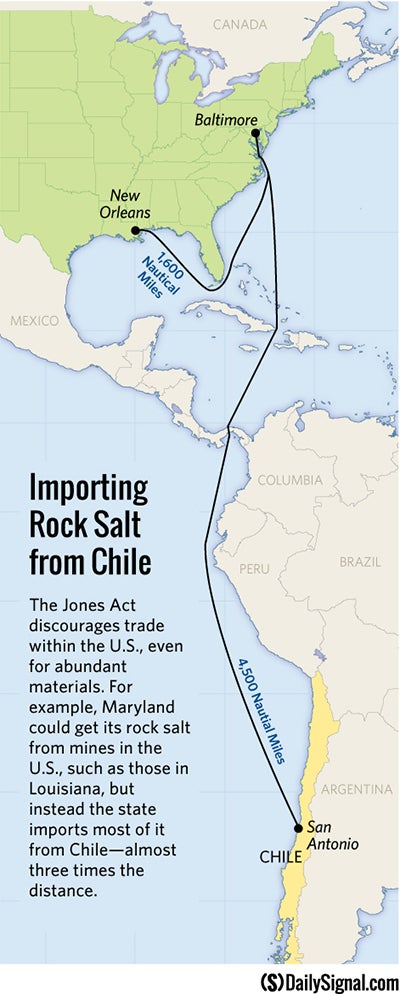Repealing the Jones Act: Good for Energy, Great for America
Marshal Wilson /
On January 13, Senator John McCain (R–AZ) filed an amendment to S. 1, the Keystone XL Pipeline Act, that would repeal part of a 95-year-old protectionist policy that does not allow foreign seagoing vessels to engage in trade between United States ports. Though it ultimately did not go to a vote, McCain’s amendment would have introduced good policy that would have significantly benefited Americans.
The Merchant Marine Act of 1920, also known as the Jones Act, requires that all goods traded between U.S. ports be transported by U.S.-owned, U.S.-built, U.S.-flagged, and at least 75 percent U.S.-crewed ships. Although the McCain amendment would not have eliminated the Jones Act, it would have made considerable progress by introducing competition into the industry by eliminating the mandate that ships carrying goods between U.S. ports be built at American shipyards. Competition within the transportation sector would encourage efficiency, interstate trade, and greatly benefit U.S. consumers.
According to a report by the Congressional Research Service, the cost of a U.S.-manufactured ship is about four times that of foreign competition, and crew costs for “Jones Act–eligible” vessels are several times higher than foreign counterparts. These higher operating costs make shipping between U.S. ports as much as three times the rate of shipping to a foreign port.
For example, the cost of shipping a barrel of crude from the Gulf Coast to northeastern refineries, where it could be refined and sold, may cost as much as seven dollars because it is required to travel on Jones Act–eligible ships. Conversely, the same barrel of crude coming from the Gulf Coast would have to travel further to get to an eastern Canadian port (one of the few exceptions to the U.S. crude oil export ban), but would cost a mere two dollars a barrel in shipping charges.
The McCain amendment would likely have allowed more U.S. oil to reach more U.S. refineries, and would have done so in a more efficient and effective manner by making foreign-built vessels available for transportation. This could have resulted in lower gas prices, both domestically and globally, as well as offer more affordable energy resources to places such as Hawaii and Puerto Rico, which rely on the energy sources produced in the contiguous 48 states. It would also have created competition in the U.S. shipbuilding industry, and allowed lower prices and innovation that come with competition.
The benefits wouldn’t have been limited to the energy sector, though. Eliminating the requirement to use only ships built in the U.S. would have given Americans more options and opened up opportunity for other American businesses.
Senator McCain’s amendment would have allowed foreign-built vessels to compete with the Jones Act–eligible fleet, which, in turn, would allow development of stronger, more independent domestic commerce; lift unnecessary financial burdens on American businesses; create jobs at U.S. ports; and promote a stronger economy. This specific amendment is now dead—but its prescriptions should not be. Congress should repeal the Jones Act.

